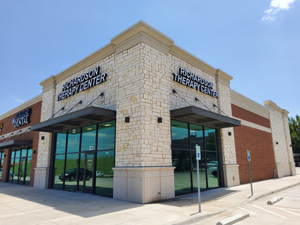Shoulder pain and stiffness can make even simple tasks—like reaching for a cup or putting on a shirt—feel impossible. Two of the most common causes of this discomfort are frozen shoulder (adhesive capsulitis) and rotator cuff tears. Though they affect the shoulder differently, both conditions can severely limit your range of motion and quality of life.
At Plano Orthopedic & Sports Medicine Center (POSMC), our specialists help patients throughout North Texas recover from shoulder injuries using advanced, customized physical therapy programs that restore mobility, reduce pain, and prevent future issues.
Understanding Frozen Shoulder
Frozen shoulder occurs when the connective tissue surrounding the shoulder joint (the capsule) thickens and tightens, restricting movement. It often develops gradually and can last months or even years if not properly treated.
Common causes include:
-
Injury or surgery that limits shoulder use
-
Diabetes or other inflammatory conditions
-
Prolonged immobilization (such as wearing a sling)
Typical symptoms:
-
Stiffness that worsens over time
-
Dull, aching pain in the shoulder
-
Difficulty lifting the arm or rotating it outward
Understanding Rotator Cuff Tears
The rotator cuff is a group of four muscles and tendons that stabilize the shoulder and control movement. A tear occurs when one of these tendons is overstretched or damaged—either from a sudden injury or repetitive strain over time.
Common causes include:
-
Repetitive overhead movements (throwing, lifting, painting)
-
Age-related wear and tear
-
Falls or sudden jerks to the arm
Symptoms include:
-
Pain when raising or lowering your arm
-
Weakness in the shoulder
-
Clicking or popping sounds during movement
How Physical Therapy Helps Both Conditions
Whether you’re dealing with a frozen shoulder or a rotator cuff tear, physical therapy plays a critical role in recovery. At POSMC, our physical therapists design personalized rehabilitation programs based on your diagnosis, injury severity, and activity level.
Physical therapy goals include:
-
Restoring shoulder flexibility and mobility
-
Reducing pain and inflammation
-
Strengthening surrounding muscles for better stability
-
Improving posture and joint alignment
Common Physical Therapy Techniques
Your treatment plan may include:
-
Gentle stretching exercises to gradually increase motion
-
Strengthening exercises using resistance bands or weights
-
Manual therapy to improve joint and tissue mobility
-
Heat or cold therapy to manage pain and inflammation
-
Home exercise programs to continue progress between visits
For frozen shoulder, therapy focuses on slowly breaking up adhesions and increasing flexibility. For rotator cuff tears, therapy targets rebuilding muscle strength and tendon stability to restore full function.
Comprehensive Shoulder Care at POSMC
At Plano Orthopedic & Sports Medicine Center, our team of board-certified orthopedic surgeons and licensed physical therapists work together to ensure every patient receives the best care possible—from accurate diagnosis to full recovery.
If you’ve been diagnosed with a frozen shoulder or rotator cuff tear, or if you’re struggling with ongoing shoulder pain, our experts can help you get back to the activities you love—pain-free and confident.
Richardson Therapy Center
Contact Us Directly: 972-250-5690
 2040 E. Pres. George Bush Hwy Suite. 100
2040 E. Pres. George Bush Hwy Suite. 100
Richardson, TX 75082
Phone: 972-250-5690
Fax: 844-250-2431
Hours: Monday-Thursday 7 a.m. – 7 p.m.
Friday 7 a.m. – 5 p.m.
